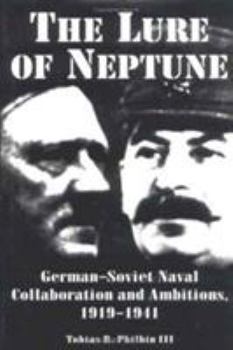The Lure of Neptune: German-Soviet Naval Collaboration and Ambitions, 1919-1941
No Synopsis Available.
Format:Hardcover
Language:English
ISBN:0872499928
ISBN13:9780872499928
Release Date:November 1994
Publisher:University of South Carolina Press
Length:214 Pages
Weight:1.00 lbs.
Dimensions:0.8" x 6.5" x 9.5"
Related Subjects
HistoryCustomer Reviews
2 ratings
Detailed insights into one of the most interesting alliances of all time
Published by Thriftbooks.com User , 17 years ago
At the end of World War I, the nascent Soviet Union and post-Kaiser Germany were both economically and militarily prostrate. The war and consequent revolution in the Russian Empire had left the country unstable and their aggressive socialist ideology turned most of the rest of the world against the Soviet Union. Contrary to what the German leaders thought when they requested the armistice, the victorious powers were determined to exact as much political and economic revenge as they could. In this context, two countries that were ideologically opposite found themselves pariah nations, which led them to make a political common cause. The main consequence was the treaty of Rapallo in 1922, where both nations agreed to renounce all territorial and economic claims against the other. In a secret protocol, the Soviet Union agreed to allow the German military to conduct training exercises on Soviet soil. This allowed the German military to operate in violation of the Treaty of Versailles, which had ended World War I in Europe. The navies of the two nations also cooperated. For some time, both nations had dreams of developing a powerful navy and their cooperation was another way both could pursue their respective agendas. However, that cooperation did not get really interesting until Hitler took power in Germany and began to pursue his expansionist aims. At first, Stalin continued to court Britain and France, but after their acquiescence at Munich, he decided to strengthen his ties to Germany under the Nazis. Stalin and Hitler both understood that a war between their nations was inevitable. However, they each considered themselves to be a master player in the global political arena, so they continued the cooperation to see what advantage they could create. Despite all of the detail and descriptions in this book, it is difficult to conclude that either side gained a distinct advantage in the naval cooperation. It was a complicated act of political gamesmanship, where each side distrusted the other and constantly maneuvered to try to get what they wanted at the least cost to themselves or gain for the other side. This is truly a fascinating book as it demonstrates how circumstances can drive even the most obvious and determined of enemies into forging a temporarily viable alliance. In the political history of the world, there were few if any instances where the politics of the moment made "friends" of such disparate entities. Based on documents published shortly after the collapse of the Soviet Union, this book gives detailed insights into that most interesting of times.
Throwing Light On A Little-Known Topic
Published by Thriftbooks.com User , 25 years ago
In this concise study, Tobias Philbin thoroughly dismantles the widely held notion that the period between the Nazi-Soviet Non-Aggression Pact and the German invasion of Russia was merely a convenient breathing space for Stalin to prepare for his coming war against Hitler. In fact during this period the Soviet Union actively cooperated with Hitler's war against the Western Powers. Among Stalin's un-neutral acts: granting the Germans the use of a U-Boat replenishment base near Murmansk (Basis Nord); facilitating the travel of German commerce raiders from the North Sea across north Russia to the Pacific; and cooperating with the German seizure of the American merchant vessel, City of Flint. In fact the Jan Wellem, which the Germans based at Basis Nord to supply their submarines, would participate in the German invasion of Narvik in April 1940 (where the British promptly sunk her). Unfortunately for Stalin, the relationship was largely one-sided, with the Germans continually delaying promised deliveries of coveted naval technology (including plans for the formidible battleship Bismarck). Excellently documented in Soviet and German sources (some of which were captured by the Allies at the end of the war), Philbin throws considerable light on a previously well-hidden aspect of the Second World War.






